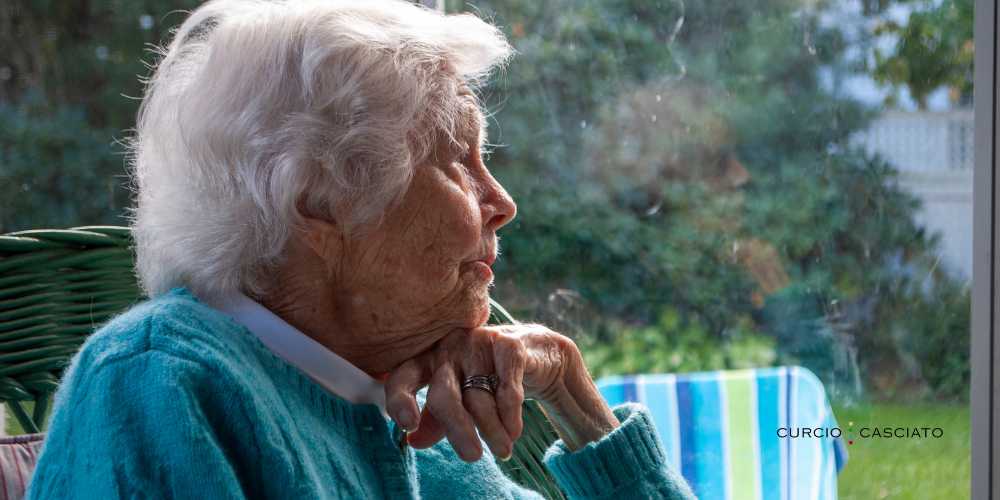Can family members be held liable for allowing an elderly parent to live alone in Illinois? This question affects many families struggling to balance a loved one’s independence with safety concerns. When an elderly parent refuses to enter an assisted living facility or senior care home, adult children may wonder if they have a legal obligation to intervene.
Under Illinois law, family members are not automatically held liable for allowing an elderly parent to live alone. However, they may be held responsible in situations involving elder abuse, neglect, or failure to provide appropriate care. If a vulnerable adult is left in a dangerous situation without access to necessary care, such as medication, personal hygiene support, or help with daily tasks, adult protective services or social workers may become involved. Understanding the risks, legal duty, and necessary care options, such as home care, respite care, or obtaining guardianship, is critical for protecting the elderly individual’s well-being.
Consulting an elder law attorney can help families navigate senior care decisions, assess liability, and determine whether other family members or a primary caregiver could be held responsible for neglecting proper care.
The Chicago nursing home lawyers at Curcio & Casciato recognize and understand the complexities of situations like this, and we are committed to protecting everyone’s rights. For a free consultation, call 312-321-1111.
Is It Against the Law to Leave an Elderly Person Alone in Illinois?
No, leaving elderly people alone isn’t against the law in Illinois. However, under the Illinois Adult Protective Services Act, it can be considered neglect or abuse if a person knowingly leaves a vulnerable adult without the ability to care for themselves and without arranging appropriate care.
For example, if the elderly individual has dementia or is otherwise incapable of handling daily tasks, such as taking medications, preparing food, personal hygiene, or basic safety, and someone with a duty of care (guardians or professional caregivers) fails to act, that person may be held liable.
In extreme cases, this can lead to civil liability or even criminal charges, especially if leaving the elderly individual alone results in serious harm.
To avoid legal consequences, adult children or other responsible parties should assess the elderly person’s capacity, document care efforts, and contact APS if they’re unsure about the proper course of action.
When Can Family Members Be Held Liable For Allowing an Elderly Parent to Live Alone in Illinois?
Family members can be held liable for allowing an elderly parent to live alone in Illinois when they knowingly disregard signs that the parent is unable to safely care for themselves and fail to take reasonable steps to provide care or assist with care needs. Responsibility in Illinois may arise in the following situations:
- The elderly parent cannot provide themselves with necessary care due to dementia, cognitive decline, serious illness, or mobility impairments, and family members are aware of these caregiving limitations.
- Adult children or other individuals responsible for the parent’s well-being may be the primary caregivers, but they may not have been monitoring or supporting their daily needs.
- There is a pattern of abandonment, such as failure to assist with medical care, the elder adult’s personal hygiene, nutrition, and household chores, resulting in safety issues, injury, or serious risk to elderly people.
- The elderly parent suffers injury or death as a result of being left in the house alone, especially when warning signs were present and ignored.
- Family members fail to involve APS or arrange alternative care options such as home care, assisted living, or guardianship when clearly necessary.
Responsibility typically depends on whether the family’s inaction meets the legal standard for neglect and whether the harm was foreseeable. Consulting an elder law attorney can help determine specific legal exposure.
Can Social Services Force Someone Into A Nursing Home in Illinois?
In short, no one can force a vulnerable adult into an assisted living facility unless friends or family have proven that:
- They can’t safely take care of themselves.
- They require round-the-clock care.
- Home health care isn’t an option.
- Family members can’t house and take care of them.
- They are suffering from cognitive impairment, such as dementia.
This means that social workers cannot intervene unless they clearly see that an elderly person is suffering outside of skilled nursing care. They are at risk of falling, developing bedsores, becoming malnourished, or not being able to continue to care for themselves in general. The goal of a social worker is to help elderly people by keeping them safe and healthy. Sometimes, nursing homes are the best solution for vulnerable adults, even if it’s not the preferred option.

Can Social Services Remove an Elderly Person From Their Home?
Yes, social services in Illinois, specifically APS, can remove elderly people from their homes, but only under limited circumstances. Removal typically requires one of the following:
- The elderly adult lacks the capacity to make informed decisions about their health, safety, or living conditions, often due to dementia, cognitive decline, or serious illness.
- There is clear evidence of danger, such as malnourishment, untreated medical conditions, unsafe living conditions, or inability to perform basic daily tasks like taking medication, bathing, or cooking.
- APS obtains a court order, often with the assistance of social workers, doctors, or police, which leads to emergency placement in a hospital, nursing home, or other safe environment.
- Guardianship is established through the court, either temporarily or permanently, if the person is found legally unable to make safe decisions about their care or living arrangements.
Social services cannot forcefully remove elders from their homes if they are mentally competent, even if others disagree with their choices. In such cases, family members may need to pursue guardianship or petition the court if safety concerns remain.
Can a Doctor Force You Into a Nursing Home in Illinois?
No, a doctor cannot force you into a nursing home in Illinois unless specific legal conditions are met. In general, mentally competent adults have the right to refuse placement in a nursing home, even if physicians believe it is the best option.
However, exceptions apply when:
- The individual lacks decision-making capacity due to dementia, severe mental illness, or cognitive decline, and is unable to understand the consequences of refusing care.
- A legal guardian has been appointed by the court, and that guardian agrees with the doctor’s recommendation for nursing home placement.
- A court order is issued based on medical evaluations, evidence of incapacity, and proof that remaining at home would create a serious risk for the person.
In these cases, a doctor’s opinion may serve as supporting evidence, but it does not, by itself, have legal authority to compel nursing home placement. If there are concerns, family members or social services may petition for guardianship, or APS may intervene.
Can a Power of Attorney Put Someone in a Nursing Home in Illinois?
Yes, a power of attorney (POA) can put someone in a nursing home in Illinois, but only if the POA document explicitly grants that authority and the individual who granted it is no longer capable of making informed decisions.
For a POA to authorize nursing home placement:
- The POA must include health care powers that specifically allow the agent to make decisions about long-term care, including admission to a nursing home or assisted living facility.
- The elderly adult must be deemed incapacitated or not able to make their own medical decisions by a physician, according to the POA document.
- The POA agent must act in the person’s best interest, consistent with their known wishes and care needs. The agent cannot override the individual’s choices if they are still mentally competent.
If the POA lacks clear language about a care plan or is being disputed, family members or interested parties may need to go to court to establish guardianship or seek judicial review of the POA’s actions.

Signs Elderly Cannot Live Alone
Signs that an elderly adult cannot live alone include:
- Cognitive decline, such as memory loss, confusion, getting lost in familiar places, or time confusion
- Frequent falls, bruises, or events indicating mobility issues or poor balance
- Not paying bills, unopened mail, or signs of issues managing finances
- Spoiled food, empty refrigerator, or significant weight loss suggesting poor nutrition
- Worsening hygiene, wearing the same clothes, or not bathing
- Missed medications
- Cluttered, unsanitary, or unsafe living conditions, tripping hazards, and poor lighting
- Social isolation
- Increased hospital stays, emergency room visits, or untreated health problems
- Signs of depression, anxiety, or emotional distress
- Difficulty completing household chores, cooking, shopping, or laundry
- Incontinence issues without proper hygiene or supplies
- Inability to recognize dangerous situations
If several of these signs are present, family members should consider an evaluation for home care, assisted living, or other appropriate support to protect their elderly parent.
Elderly Parent Refuses Assisted Living in Illinois
When an elderly parent refuses assisted living in Illinois, adult children may feel powerless, but care options exist depending on their parent’s mental capacity.
If the elderly parent is mentally competent, they have the legal right to make their own decisions, even if their family members disagree. In this case, family members can’t force a move, but they should document their concerns, offer support in their parents’ own home, and watch for signs of decline.
If an elderly parent refuses to go to a nursing home, but they don’t have the capacity to live alone, adult children may petition for guardianship. In this process, judges appoint someone to make decisions about medical care, housing, and other necessities.
For urgent cases, APS may intervene if the parent is deemed vulnerable.
The Illinois judicial system emphasizes autonomy but permits APS intervention when elders refuse care and create a serious danger to themselves. Contacting an elder law attorney at our firm can help assess the best path forward.
Caring for Elderly Parents in Illinois
This requires children respecting their parents’ need for independence while ensuring they are safe and have support. Some families take on managing care options and coordinate with social services, or explore long-term care options like assisted living facilities or nursing facilities.
In Illinois, families aren’t obligated to be hands-on caregivers, but filial support laws could come into play, especially when public benefits or financial obligations arise.
When an elderly adult refuses help or shows signs of being unfit to care for themselves, consider obtaining guardianship or consulting APS.
Support options include home health aides, memory care programs, and financial planning for long-term assistance. Our lawyers can help families understand responsibilities, access benefits like Medicaid, and safeguard the parents’ wishes while respecting their autonomy.
Power of Attorney for Elderly Parent
Basically, a power of attorney is a document that appoints someone to make financial or medical decisions on behalf of someone else, especially if they’re suffering from self-neglect, suspected abuse, or an inability to make their own decisions. This document also provides specific instructions about what someone wants for medical care or financial management. Generally, the person appointed is called the agent. Many people of older age will appoint a trusted friend or family member as their agent so that they can receive the care that they desire, especially when they’re too physically or mentally ill to do so.
Uniform POA Act
The National Conference of Commissioners on Uniform State Laws (ULC) proposed this U.S. law in 2006 with the goal of creating consistent POA provisions throughout the country. 29 U.S. states have legislated the Uniform POA Act as of 2021.
The provisions of this act include:
- A POA document is valid and long-lasting as soon as someone signs it.
- The responsibilities of a POA agent end once the senior citizen dies.
- The POA document must specifically state compensation rules for agents and other beneficiary changes.
- Third parties can’t be held liable for an agent’s decisions made under the guise of a valid POA agreement.
What An Agent Can Do
An agent can decide:
- Whether they should admit or release their loved one from a nursing home or a hospital
- Which medications or treatments should their loved ones should or shouldn’t receive
- Who can access their loved one’s medical records
It’s important to remember that an agent can only make decisions like this if their loved one can’t make these decisions by themselves for whatever reason. The agent is also required to honor the wishes of their loved one while deciding on major medical care. Another important thing to remember is that the agent can only make medical decisions based on the senior citizen’s financial means. So if the senior can’t afford to live in an assisted living facility, they can’t just send them there.
Power of Attorney for Health Care vs. Living Will
In short, a living will is a document that provides instructions on end-of-life care. More specifically, this document states whether or not you want health care withheld or withdrawn if you’re suffering from a terminal illness.

FMLA to Care for Elderly Parents Examples
- Time off the job to accompany your parent to surgery and manage post-operative treatment in their own home
- Providing care during a hospital stay and helping with discharge planning or transition to an assisted living facility
- Assisting a parent with a serious medical condition who can’t manage tasks alone
- Coordinating and supervising care home assistance or medical treatments when the parent cannot give themselves the medications
- Extended time off your job to relocate a parent to an assisted living facility and arrange for proper medical documentation
- Managing a parent’s recovery from a serious illness where they need help with mobility, feeding, or hygiene
- Staying with a parent during a mental health crisis or period of cognitive instability
- Helping a parent adjust to new routines following a diagnosis that impairs their ability to live alone or hinders their independence
Under the Family and Medical Leave Act (FMLA), eligible workers may take off up to 12 weeks without risking their job to help a parent with a serious condition. This doesn’t apply to in-laws or casual assistance.
How Can You Legally Force Someone Into a Nursing Home?
How do you put someone in a nursing home against their will in Illinois?
Maybe you’re a worried friend or family member reading this, and you’re Googling “memory care near me” or “care home near me,” and you’re wondering how you can legally put your loved one into a home. Basically, the only way you can legally do this is by obtaining guardianship of your loved one.
Guardianship of Elderly Parent
Guardianship, also called conservatorship, means a person is court-ordered to provide appropriate care for someone else’s health and property. Guardianships are most common for:
- Senior citizens who can’t take proper care of themselves
- Minors
- Mentally or developmentally disabled adults
- Adults found to be medically incompetent
Obtaining Guardianship of a Senior Citizen
Oftentimes, a senior citizen’s loved one or Adult Protective Services (APS) will start the lengthy guardianship process. Judges, APS staff, neuropsychiatrists, psychologists, and elder law attorneys will generally be involved in the process. The person pursuing the guardianship will have to pay for the senior citizen’s legal counsel, all physical or mental evaluations by the doctors, and various other court fees.
If all doctors and APS staff members determine that the senior citizen can no longer make sound decisions or provide their own care, then the person pursuing the guardianship will likely win. If the guardian wins, the court will likely provide limits over their authority for the sake of providing as much autonomy to the senior citizen as possible. For example, the court may allow the guardian to decide where the senior citizen lives, what kind of physical care they receive, and how their money is managed. If a guardian acts outside of the court-ordered authority, they may have to spend more time in court.
How Do You Know When It’s Time to Put Your Parent in a Nursing Home?
If you’re a senior citizen, you may worry that either social services or family members will violate your rights and wishes as you get older by forcing you into an old folks home. Of course, many families don’t do this with evil intentions. Generally, loved ones decide about nursing homes with your well-being and best interests in mind. Your family may determine that a senior living community is your best option for the reasons listed below.
They Need Round-the-Clock Care Options
As you get older, you may struggle to care for yourself like you always have. This means that you’ll need friends, family, or even a primary care physician to meet your daily needs. Providing constant care can feel impossible for many loved ones of seniors because they often have jobs, kids, and other responsibilities. Unfortunately, most families feel that they can’t provide appropriate care for their senior loved one, and therefore, the best alternative is a long-term care facility.
They Don’t Have the Mental Capacity to Make Sound Decisions
Some seniors develop severe mental and neurological issues in their old age, such as dementia or Alzheimer’s. If this is the case for you, your doctor and loved ones will likely have to make health decisions for you, especially if you’re incapable of understanding reality and making safe decisions. This is because it’s dangerous for dementia and Alzheimer’s patients to remain living in their own homes without constant support.
They Require Respite Care
Respite care is often required for seniors who are recovering from a major procedure or a lengthy hospital stay. For example, maybe you’re recovering from a back injury, and your doctor says you’re well enough to leave the hospital but not to go home alone. That’s when friends or family may suggest a respite care home while you finish healing.
They Can’t Afford Home Health Care
Many loved ones prefer home health care for their senior parents or loved ones. Unfortunately, hiring a full-time nurse in your home is often more expensive than long-term care facilities, even with health insurance. However, the exact rates depend on the state, the assisted living center, and home care providers. Monetary situations like this often leave social services with no choice but to take seniors to a facility to receive care.
Differences Between Legal Responsibility and Feeling Guilty
In the context of helping a parent, responsibility may include following guardianship orders, complying with POA, and not neglecting the parent. If someone doesn’t meet these requirements and their parent is injured, they can be held liable in the civil and criminal process.
Feeling guilty is an emotional response, not a legal standard. Many children feel guilty for placing their parents in an assisted living facility or not being able to help them 24/7.
It’s important to remember your feelings don’t equal liability. You do not have to become a caregiver unless you have accepted the role in the legal process.
Understanding the difference can help you make informed choices without being driven solely by your feelings.
Contact a Chicago Elder Law Attorney For a Free Consultation
Not everyone wants their elderly relative to spend the rest of their lives in a nursing facility. It’s often a challenging and emotional decision for the loved ones and the senior citizen. Similarly, no one wants to feel like they have no other choice but to obtain guardianship over a senior citizen. Whatever your circumstances are, an elder law attorney at Curcio & Casciato wants to protect your legal rights.
If you believe that caregivers in an assisted living facility hurt your elderly loved one, our Chicago elder abuse attorneys can also provide representation for senior citizens suffering from nursing home negligence and elder abuse. We also handle Chicago nursing home bed sore claims, Chicago nursing home malnourishment claims, and Chicago nursing home falls claims.
Call 312-321-1111 to schedule your free consultation.
